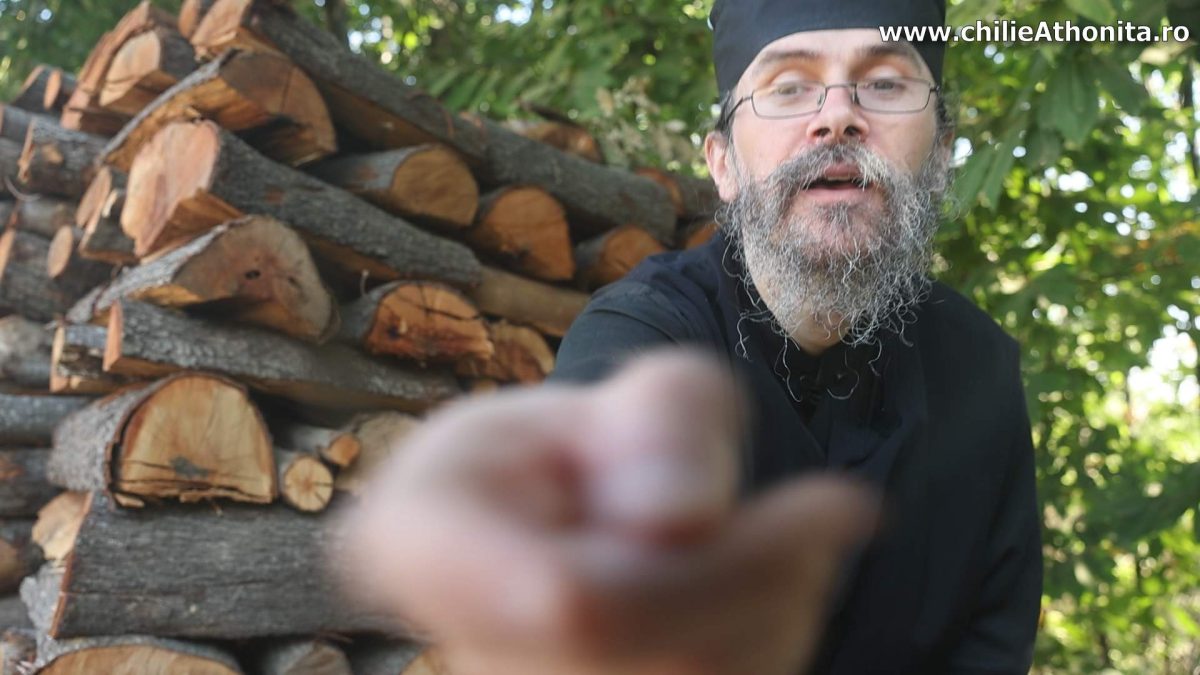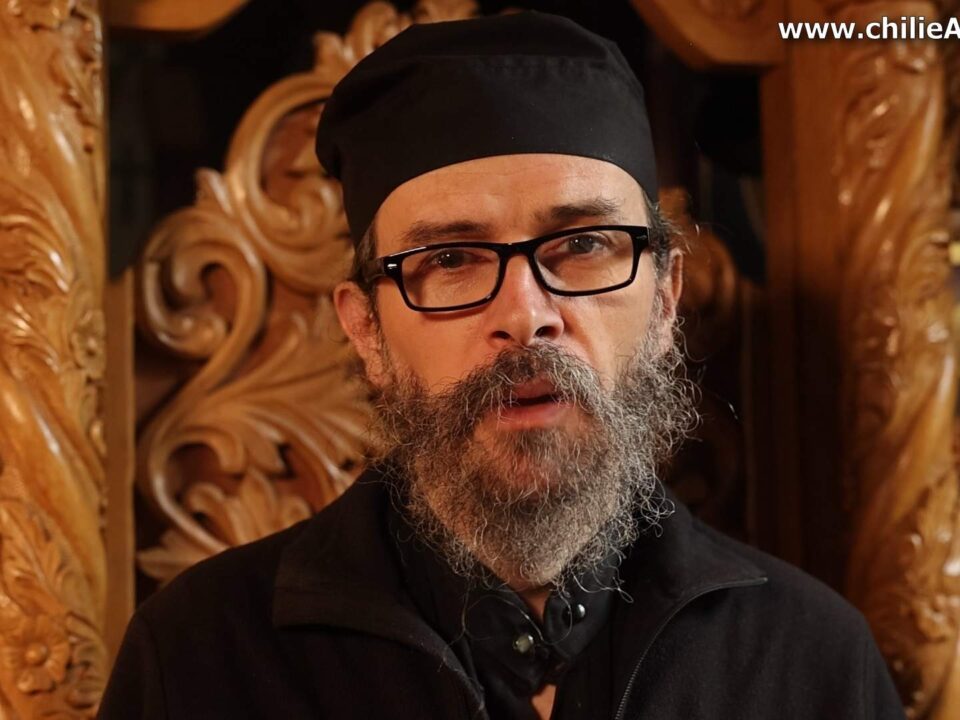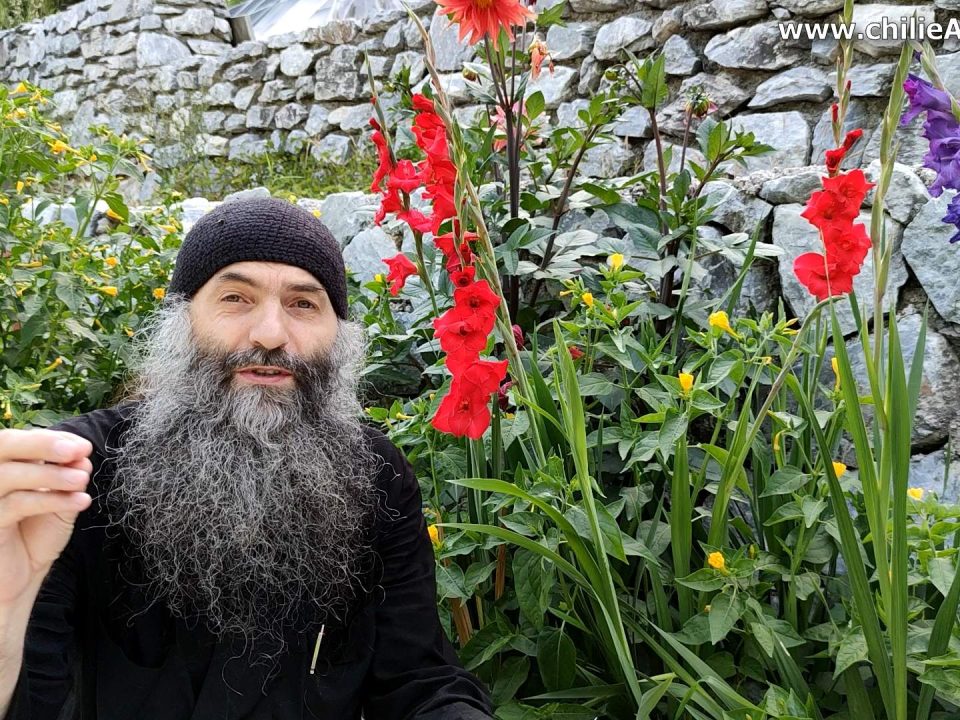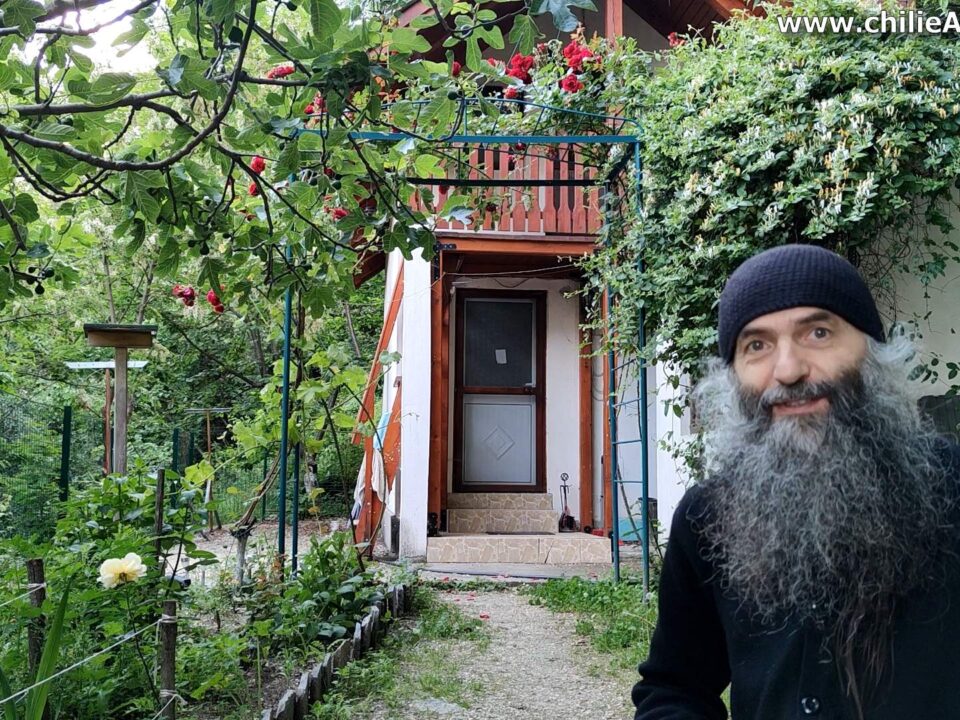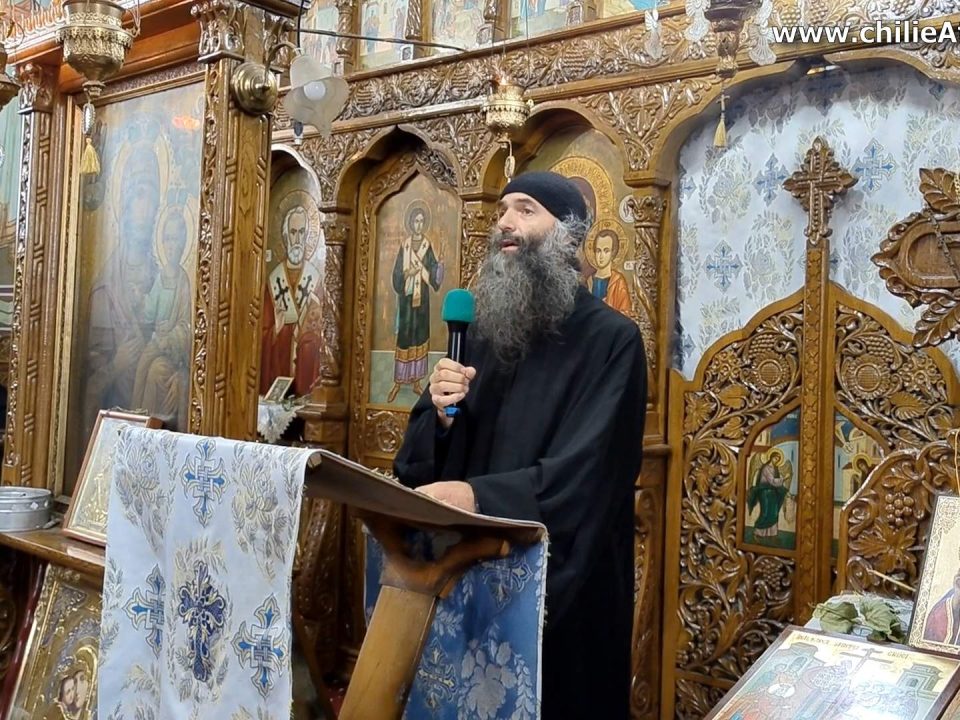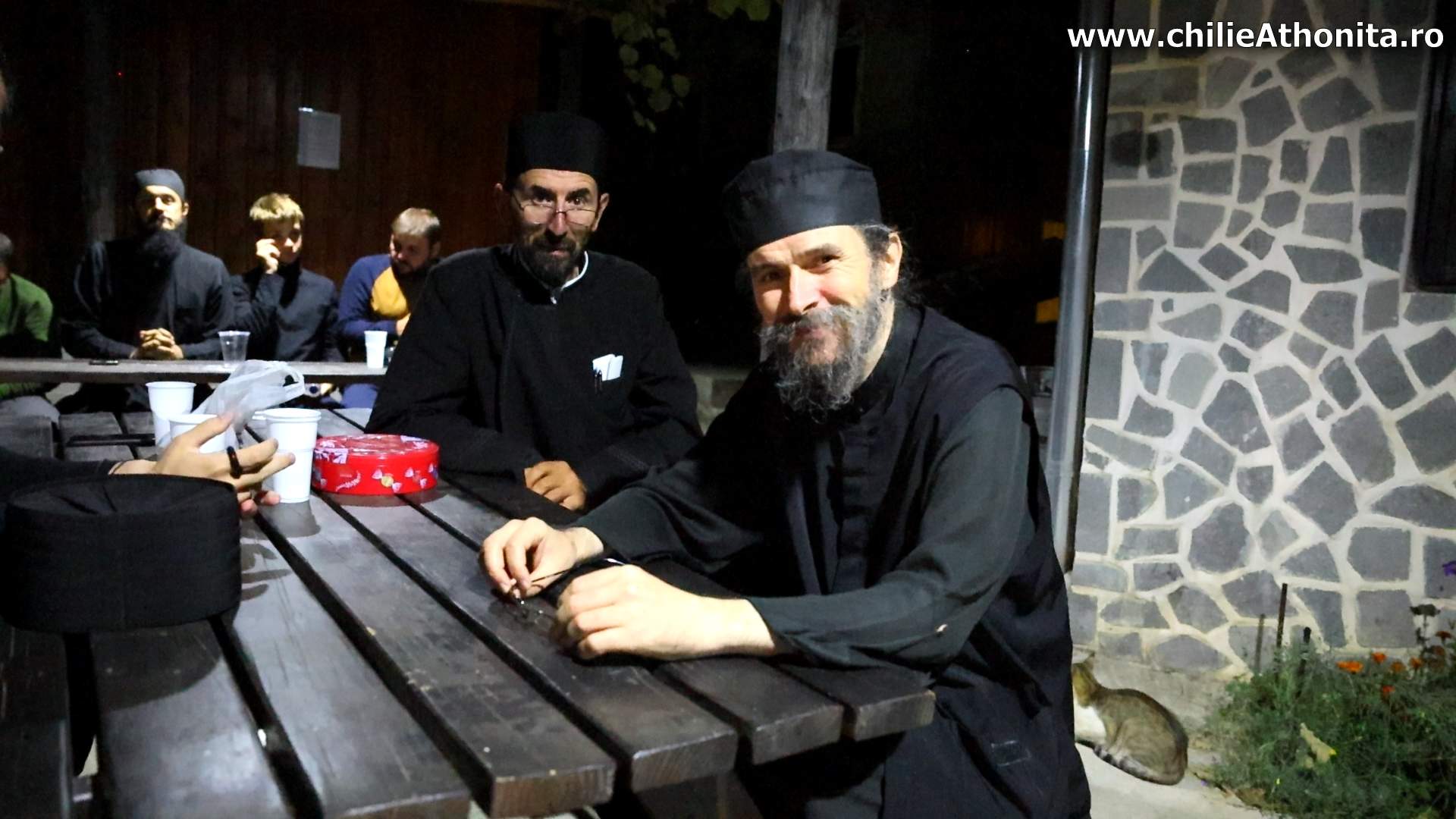
Miracles in Programming, Artificial Intelligence and the Family – Father Theologos
28 August 2022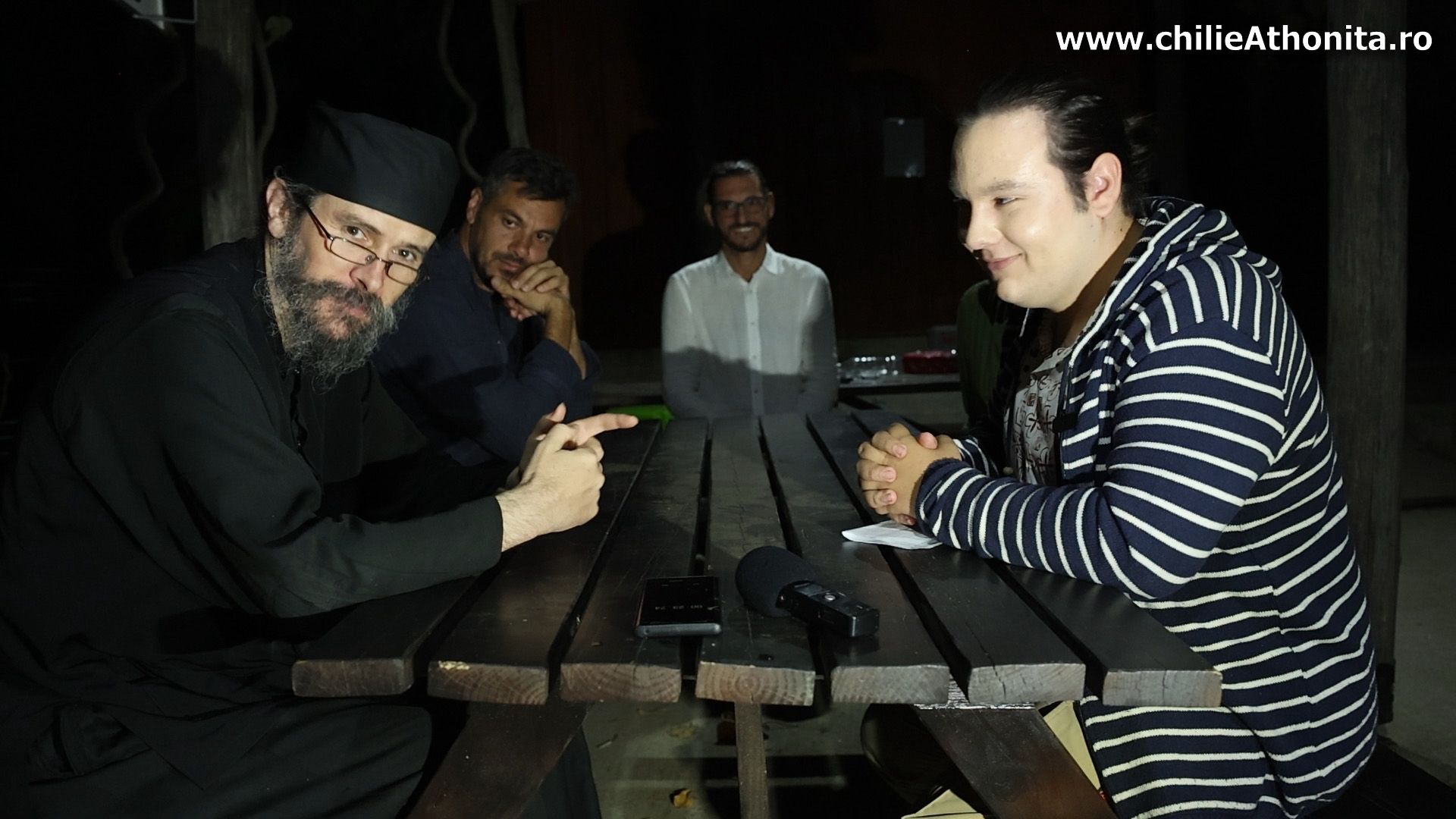
To the Young People of Today – Radio Trinitas Interview with Father Theologos
4 September 2022We all want to be free. In fact, the entire history of mankind revolves around a few ideas – one of them being the idea of human freedom. The problem, however, is that having a darkened mind we do not know how to secure our freedom and if we manage to acquire it, we are not able to keep it.
Enjoy!
Glory to the Father, and to the Son, and to the Holy Spirit, and now and ever and unto the ages and ages. Amen
Through the prayers of our holy fathers, Lord Jesus Christ, Son of God, have mercy on us! Amen
Today we will talk a little about repentance, brothers, as our personal journey, our personal journey towards holiness.
We agreed in previous episodes that we all sin, right? In fact, there is no need to prove this, because every man who is honest with himself realizes that he is wrong. It is true, however, that we must have the courage to admit it.
This very gift of seeing one’s own sin, know that it is a great gift for which Saint Ignatius Brianchaninov and not only, Saint Paisios and many, many other saints in the history of the Church prayed earnestly.
Know that this is the biggest difference between us and the devils: that we, with God’s gift, can see our own sins and repent for them, while the devil is stuck in his position. Man is flexible, he has the flexibility of humility of which I have spoken before, while the devil moves at full speed towards what he considers perfection—that is, towards the absurdity of absolute evil. Do you understand? The devil is a hardened man, while the spiritual man is very soft, he is absolute flexibility, absolute spirituality, the spirit par excellence.
Repentance is capital for us because God gives us the opport unity for a new beginning. A real great reset, you know, brothers, coming from God’s love and His forbearance towards us, his beloved children who have wandered down the existential hills to satisfy our pleasures, to try to find all kinds of chimeras, of personal purposes, and so on. And we do this for the thousandth time, and we upset Him for the thousandth time, as we upset our parents, or the moment we make a nuisance. That’s what happens, brothers.
And then we must turn to God, because He waits for us just as our parents patiently wait for us to repent. It’s pretty much the same mechanism, and that’s why we call God Father. Because He acts toward us like a loving Father.
Repentance is the transition from the state against the nature to the natural state. Due to the fact that sin is distorted pleasure, repentance is done through asceticism and pain. Sin is pleasure, repentance must be pain and need.
Brethren, today we are a very hedonistic society—that is, very pleasure-loving society—and that is why we do not repent. We no longer repent because we avoid with all our being the asceticism and pain. Because we do not repent, sin passes for virtue, and because of this society hardly recovers — IF it recovers and still, because of this, you see that great troubles are coming upon mankind, brethren. The hideous and unimaginable horrors that are utterly destructive to the human personality.
Once again: the great troubles that await us and into which we have already entered, are not so much because of sin, even if man sins today more than the other times, but because we love ourselves very much, that sin passes for virtue and therefore the possibility of repentance, the possibility of return is cut off. That’s the problem, brothers. Do you understand?
Things are all the sadder because the good God has also given us another way of true repentance, without labors and troubles, which also forgives sins, and this way is participation in the mysterious life, in the Sacrament life of the Church. Of course, par excellence, the Sacraments that forgive sins are confession, baptism and the great schima (“the second third”), but also the Sacrament of Holy Communion where it says “For the forgiveness of sins towards eternal life” and, if you like, the mystery of the Holy Unction where it is also said “To the healing of soul and body”.
Now, however, we will not go into the details of these mysteries because this true way of repentance does not have the expected effects without the first way. That is, the mysteries are valid, but our repentance is needed, repentance through asceticism, through toil and hard work.
On this path of toil and asceticism, of course, the greatest asceticism is listening, cutting off the will before the other — something we have talked about at length in the episodes dedicated to listening and, briefly, about the relationship between repentance and listening I spoke in the episode dedicated to repentance that I published on the Feast of the Holy Apostles Peter and Paul.
Now, brothers, you must know that obedience is the greatest pain, why? Because the expression par excellence outside the human personality is his will, his will. And because of this, the moment he cuts off this distorted will, which, as I said, today is sick of self-love, at that moment the man is hurting. And you know very well, we all have this experience of cutting the will.
That’s why we have to cut our will. Not necessarily because the other is perfect, not necessarily because the other is smarter than we are, but to get rid of this great nuisance, this great pleasure that keeps us enslaved — that is, self-love, the fulfillment of our own will.
Today, however, we will talk more about repentance as an act of personal assumption of coming out of sin, of coming out of the existential distortion in which we find ourselves — because sin is a poisonous distortion, brothers, that permeates all human existence.
In our discussion, repentance is the ceaseless renunciation of the hope of some fleshly consolation, for the flesh, is one of the principal sources of sin, of pleasure. Because the body battles against the soul, repentance is, in fact, the daughter of hope and the denial of despair. And this is because we have the soul that rises above the body, starting to control it, and not vice versa.
Do you understand, brothers? The body is irrational, it has only senses, and through these the pleasures come, and the moment these pleasures come, man separates himself from God and falls into despair. If we repent, that is, we get out of it, then the soul begins to control the body and, as I said, repentance begins to give us hope. Let’s hope and let’s get rid of hopelessness! Do you understand?
So through pain comes hope. Once again, I repeat it a third time, brothers.
Don’t you imagine that repentance is something that leads us into despair. That is not true repentance, brethren. Repentance is the thought of self-condemnation. We condemn ourselves by keeping our minds in hell, brothers, but we must not despair because then we fall into depression, as I said, and it is not true repentance.
For this, after condemning ourselves with the angry side, we immediately turn to the Mother of God and to the Lord with the willing side. I mean immediately I will say that I am a bastard, a bastard, a sinner, a oh my … and all that. After that, I immediately turn to the Mother of God and I will say to her “Mother of God, help me, do not leave me, you dear one, you precious, help me! Lord, do not leave me, help me! Lord, Jesus Christ, have mercy on me!”
Do you understand? We always turn with longing, with love for God, and with anger towards us so that we neither love ourselves nor fall into despair.
Also, repentance is self-care without caring for oneself. That is, we care for the eternal, we are very focused on the spiritual, on the invisible, while on the material, the temporal, we keep to the minimum — as much as possible, that is, the strictly necessary — so that we have the necessary undisturbance to deal with the eternal things.
The Holy Fathers you know very well that they have reached great measures here, some having only their clothes on, but we do not say that— well, now let’s not press it, even if the model is our Lord Jesus Christ who said that “the Son of Man has nowhere to lay his head.” We don’t say that.
Why don’t we say that? Because our spiritual measure, our faith, our love, and the power of our mind is not strong enough to have our minds undetached from God.
If we don’t have comfort or patience, but have a war of mind, saying, “This is bothering me, this other, this I want to do better, and so on” — this war must stop so that we can pray and focus on the heavenly.
Of course, discernment is needed: not as soon as a discomfort or comfort arises to try to ease it by offering comfort or discomfort to the contrary. On the contrary! And that’s destructive, brothers. The extremes are from the devil. Do you understand?
We must press with a good heart to the simplicity of our life, and at some point we see that we are distracted by pain or pleasure, that is, discomfort or comfort, then this disturbance must be annihilated as a cause of sin and distance from God. Just as comfort is to be annihilated, meaning pleasure.
Now you have to know that many times, it is pleasure that tempts us and not so much discomfort because we have said that we live a very very hedonistic society, very fond of pleasures that is.
You can see that in history, too, there have been two great categories of political systems that distance man from God: those that alienated man from God through pleasure, through pleasures of all kinds — as we see today in Western society, especially those that alienated man from God through pain, in our country, of course, being the classic example of communism.
I now remember IPS Pimen of Suceava who said “In the time of communism we fought evil, now we are fighting with cunning”. Do you understand? It is much more treacherous to cut repentance by pleasure because it does not act frontally, it does not act on the surface. Do you understand? The Greeks, as they themselves say and I have lived in Greece for many decades, the Greeks say that they were defeated not by the famine during the Second World War and the immediate period, but by the ease of the late 20th century. Do you understand? So pay attention to pleasure, brothers. Great attention!
The Holy Fathers even went to places without any comfort from the point of view of the relief, in the desert that helped them not only because of the desolate landscape, but also because there was a very great silence and people were absent. This, of course, helps them to break away from worldly things, and then the mind naturally turns to God. Do you understand?
Another factor that helps in repentance is the living in one place. If one lives in a place, then the mind no longer has “interesting” things, “new” things to be attracted to, and therefore, getting bored with the things around it, the same phenomenon happens: the mind leaves the outside, the things from the surroundings, and turns to itself and through itself, to God.
We don’t have to care what’s going on outside of us. Now I’m talking to you in such a concrete case and a bug landed on the lens, I don’t know what’s there. Yes… We don’t have to think about these things and our minds go in that direction. Do you understand? We need to focus on what we have to do. But if this is disturbing and likely to bother you, then it must be put aside. And now I’m really going to take this off the lens, of course I didn’t touch the lens.
So we always have to be patient as much as possible and have a calm state so that we are not disturbed by either pleasure or pain. We must not act immediately, but we must focus on what we have to say, on what we have to do—on God, on the eternal. Do you understand?
A third factor, which is very important here, is the news — which takes the mind away from repentance, from God. News, brothers, let’s understand each other — it’s not just the socio-political news you see on TV, but also the brothers’ gossip. I mean: what’s there, oh, here’s a raven croaking, what’s that, I want to see it. I don’t care, brothers. I’m not interested, do you understand? What happened there, what happened there. No. We need to cut this news. Yes.
I don’t know if you notice, brothers, that I’m constantly talking about centers of attention. News are important centers of attention and earthly news draws man to the earth, draws his mind from God, to matter, to the hardness of matter and therefore materializes man, brings him closer to sins, and man can no longer detach from their multitude.
When a person focuses on the news — that what he did, what he said, or what happened on television and overseas — it’s like focusing on a screen and not seeing anything around him. When, however, the news stops, then the man begins to see the clutter in the room and begins to see what is around him, he begins to clean things, to put things in order.
So it is like this with the mind, brothers. When it is attracted to the centers of interest, to pleasure — that is, to the outer lights as by so-called magnetic forces — forces that are felt by the brain as pleasures — then the mind, the eye of the soul, the ultimate attention no longer has time to turn to i tself and its problems, to the “news” coming from the inner universe because it is dizzy, preoccupied, and attracted by the news from the outer universe. I mean, what’s around me, who put these woods here, what’s up with that raven on top. I don’t care, brothers.
If these pleasures are strong in intensity and/or man is very close to their source — women, drink, all of that, you know what I mean as a source of sin — then man cannot escape his magnetic, attractive character. That is, the man is pulled in that direction.
It is even said that the source is attractive, and then man sticks to these pleasures and becomes addicted, sticks there like iron to the magnet.
A force at least analogous and contrary to sin, that is, the source of attraction, must be defeated and man must become free. Repentance is the source of our freedom.
Since attraction is felt as pleasure, repentance necessarily — that is, the process of liberation, the process of leaving sin — is felt by man as pain, as toil. I’ve said that before and I emphasize it.
Now, in the case of the outer, material, bodily universe, one has to do analyzes in order to detect bodily diseases. It is normal, to allocate time, to go to the doctor, to examine himself, to be examined by a specialist, to see what he has and then to be treated.
Likewise, in the case of mental illnesses, we must devote the same time—even more to examining our spiritual problems, our inner universe, our life problems. Do you understand, brothers? So mental illnesses are very similar to bodily diseases, and we must do exactly the same spiritually of course.
If we do not pay attention to them and walk through life like a boulder downhill, of course we feel in our existence these distorted forces of attraction, these magnetic forces that enslave us, but we do not even identify them, we do not know from which side they come and how to act — rather reacted — in order to preserve our freedom on our way to eternal personal perfection.
So we need to have time to take care of ourselves, and you have to know that this is the devils job today, his main goal: to give us a lot of centers of attention, of pleasure, of concerns so that we do not take care of ourselves, that we do not see what is happening in the pantry of our soul to be able to heal, to not be able to analyze our inner universe. Do you understand?
Continuing the analogy with the therapeutics of the outer universe, in the therapeutics of the inner universe, that is, in the therapeutics of attention, we need a specialist, a doctor of the soul, an inner universe doctor, that is, a confessor.
Brethren, the psychologist is a big problem — if he is a practicing Orthodox Christian, he could help something, but he must also send you to the confessor because through the confessor comes the grace of God, comes the uncreated energy of God, the only force that can take us out of the slavery of the earthly, created forces, of which we speak today. Do you understand?
Going forward, just as in the case of bodily diseases we have to take every day, twice a day — for example — pills, so in the case of mental illnesses we need a constant spiritual program — that is, to take spiritual pills twice a day or even several times a day. Do you understand? That is, we need prayer.
For a constant spiritual program, we need separation from the world, from people, from sources of disturbance. The topic of separation from the world I have discussed at length in previous posts and briefly recalled it here. We retreat to the desert and so on.
Within this constant spiritual program we need, of course, prayer and “going to the soul doctor” for analysis, that is, spiritual advice to a spiritual leader, a confessor, brothers. Of course, above this and beyond, we need good works to attract the uncreated energy, the grace of God that we were talking about before, which being uncreated, brings us out of the created. It’s also about good deeds, brothers.
So prayer, good deeds, confession. Of course, prayer and confession are included in good works, but I have emphasized the two very much.
The first effect of this program is joy and enlightenment. Relative to joy, you should know that in Greek grace, haris comes from “hara” which means joy. And that’s because, as I said, the first effect of grace is joy. This joy is smooth, serene, like a sunrise that leaves man with a whole mind and in control of himself, and not something violent, shrill, screaming like one that bursts into uncontrolled laughter.
With regard to enlightenment, it has a similar behavior — that is, smooth as a sunrise, and that is because it has as its source Christ, the Sun of righteousness which is, as He Himself affirms of Himself, meek and humble of heart.
Here, brothers, you must know that we have a big problem, not with Christ, the Sun of Righteousness, but with us.
Since it is the light of justice that comes and illuminates our interior, and the mind, the eye of the soul, is turned inward, it sees — what does it see? — sees with Justice, under the light of Justice, its interior. And that’s hell. Hell, brothers. Do you understand? Because that’s what we have inside of us after the fall.
It is, as I said, like clutter, like the dust in a room. If a room is dark, we think everything is in order, but if the first rays enter the room in the morning, we see the dust and disorder in it, as I said, and if the ray is more intense, more focused, then we can see even the dust floating in the room. Do you understand?
So it is with the enlightenment of our soul. The saints see even the smallest specks of dust in their souls, and because of this they cry, while it seems to us that everything is well. I even heard people in the confessions saying, Father, I have no sin, I have not killed anyone, I have not set anyone on fire, I have not sinned. Brothers, this is the darkening of the mind, this is the night of the mind.
As you can see, the terms related to light fit very well, and that is why the Holy Fathers used these terms, even if it is a spiritual, understandable phenomenon.
The critical point for us here is what do we do? What do we do when we see something like this? Are we slamming the door to the room of our soul, close it, pretending that nothing happened? Do we despair? Do we lose hope?
No, brothers! No. Not good! The answer is given by Saint Silouan: Keep your mind in hell and do not despair!
I hope you have read the book of St. Silouan, if you have not read it, read it! “Between the hell of hopelessness and the hell of humility.” And there the central point that our Lord Jesus Christ Himself gave to Saint Silouan is exactly this phrase: “Keep your mind in hell and do not despair!”
That is, have the courage to recognize who you are—not who you think you are—that is, to be in the hell of your soul chamber, to see and begin to tidy up there, to clean the dust and all the miseries that are there, and to have hope that God will help you. Let us condemn ourselves, brethren, let us weep, but let us have hope through prayer.
You will tell me now that you will not succeed, that you will not succeed. That’s right — no one succeeds. But if we force ourselves, wrestle with the pleasure of self-love, condemning ourselves unsparingly, and praying to God with hope, then God will take this unsuccessful struggle of ours as proof of our desire and He will give us the victory.
This is the path of repentance, brothers, this is the path of our liberation from the tyranny of the passions that is, of existential dependencies, and there is not another, so you know, brothers.
A free country means a free people, and a free people is not obtained so much by force of arms, with the force of matter — even if, God forbid! — sometimes this is also necessary, it is not obtained in this way. True freedom is obtained above this force, by the power of the Spirit, through the uncreated force of God’s grace. Do you understand?
You see that Jesus set all mankind free by spirit and not by matter, not by force of arms. So let’s do it, too, that there is no other way.
May the good God help us!
Through the prayers of our holy fathers, Lord Jesus Christ, Son of God, have mercy on us! Amen
Pomelnice online și donații
Doamne ajută!
Dacă aveți un card și doriți să trimiteți pomelnice online și donații folosind cardul dumneavoastră, sau/și să susțineți activitatea noastră filantropică, inclusiv acest site, vă rugăm să introduceți datele necesare mai jos pentru a face o mică donație. Forma este sigură – procesatorul de carduri este Stripe – leader mondial în acest domeniu. Nu colectăm datele dvs. personale.
Dacă nu aveți card sau nu doriți să-l folosiți, accesați Pagina de donații și Pomelnice online .
Ne rugăm pentru cei dragi ai dumneavoastră! (vă rugăm nu introduceți detalii neesențiale precum dorințe, grade de rudenie, introduceri etc. Treceți DOAR numele!)
Mai ales pentru pomelnicele recurente, vă rugăm să păstrați pomelnicele sub 20 de nume. Dacă puneți un membru al familiei, noi adăugăm „și familiile lor”.
Dumnezeu să vă răsplătească dragostea!


